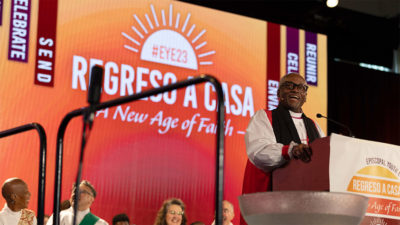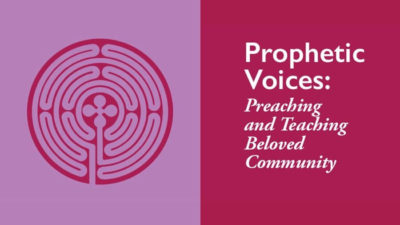The following is the text of Presiding Bishop Michael Curry’s Holy Wednesday sermon from The Church of St. Luke in the Fields, New York, New York. This sermon was pre-recorded for inclusion in the Church’s April 8 remote worship service for Holy Week.
And now in the name of our loving, liberating, and life-giving God: Father, Son, and Holy spirit. Amen.
I bring you greetings from your brothers, sisters, and siblings who are The Episcopal Church, wherever they may be, and I look forward to being with you on another occasion when we can gather together to worship our God and to sing the Lord’s song together. As we enter fully into this Holy Week, allow me to offer a text of scripture that is invoked by all four Gospels at the very beginning of this Holy Week on Palm Sunday.
It comes from Zechariah, his prophecy recorded in the ninth chapter:
Rejoice greatly, O daughter Zion!
Shout aloud, O daughter Jerusalem!
Lo, your king comes to you;
triumphant and victorious is he,
humble and riding on a donkey,
on a colt, the foal of a donkey.
He will cut off the chariot from Ephraim
and the warhorse from Jerusalem;
and the battle-bow shall be cut off,
and he shall command peace to the nations;
his dominion shall be from sea to sea,
and from the River to the ends of the earth.
Rejoice greatly, O daughter of Zion. Behold your King.
There is another way. If you look at this week that we call holy, and how it unfolds beginning with Palm Sunday marching through the week until we get to that Maundy Thursday and Good Friday and that desert plateau of Holy Saturday, it begins with a grand procession, Jesus entering the city of Jerusalem, that much we know. What is often overlooked sometimes is that that procession of Jesus into Jerusalem was not an accident. It was not mere coincidence; it was an act of divine providence planned by Jesus and strategically executed to send a message.
There is another way, think for a moment, the setting is Passover. Jesus and his followers were going to Jerusalem to observe and celebrate and to commemorate the Passover. This ancient, the holy city Jerusalem was just filled with Passover pilgrims. The city was brimming with people all over the place. Jesus knew this. He knew that the city was filled with people and more to the point he knew what Passover was about. Passover was and is a celebration of freedom. Passover remembers when the Jewish people, the Hebrew people were slaves in Egypt, and it was that Passover, that after a long and protracted series of negotiations between Moses and Pharaoh, after a long campaign of plagues, which were boycotts in their day, which were attempts to change the mind of Pharaoh, after all of that had failed, God would act decisively on that Passover night to set the captive free.
Passover was a celebration of freedom. Passover was a celebration of the freedom that God decrees and intends for all of God’s children. It was at Passover that Jesus went to Jerusalem. It was at Passover that he entered the city, on this festival of freedom. That was not an accident. Early in the story on that Palm Sunday, Jesus tells some of his disciples, go into the city to a certain place and you’ll find a donkey tied up. Untie the donkey and bring it to me. Someone will come up to you and ask, why are you untying the donkey? Just tell him, “The Lord has need of it.” Now, that’s not a quaint religious story, that was a code, that was a signal. Jesus was the leader of an underground movement, passionately committed to God’s way of love as our way of life, to unselfish, sacrificial love and determined to get that message out, to set all of God’s people, both oppressor and oppressed, to set all folk free. That was a password.
In the story, it says that when some of the disciples went into Jerusalem, they did exactly as Jesus said, untied the donkey at this particular place. Someone came up and said, why do you untie the donkey? They say, “The Lord has need of it” and the person releases the donkey to them. That’s not an accident. Palm Sunday was planned. Jesus planned to enter Jerusalem at Palm Sunday. He planned to enter the city of Jerusalem on the festival of Passover.
Now, why? Well, because Passover was a festival of freedom and the Jewish people were a conquered people under the iron boot of the Roman empire, a brutal empire. They were a colony; they were a subject people. They were living now in a new kind of servitude, a new kind of bondage. Now, not in Egypt, but in their own land, now under the boot of Rome. It was at Passover when the city was filled with pilgrims that the Roman governors would enter the holy city now by the Western gate of the city. Imagine for a moment, Pontius Pilate entering Jerusalem with a legion of soldiers before him, with cavalry accompanying him, with soldiers carrying insignias – Caesar, son of God, emperor of Rome. Pilate entered the city, the historians tell us, from the Western gate of the city coming from his palace fortress [Cesarea] by the Mediterranean sea, entering the city in regal outfit, riding on a war horse.
The scholars tell us that Jesus entered the city from the Eastern gate. I was in Jerusalem at Holy Week a few years ago and saw that Eastern gate, a place where Jesus entered the city. It is likely that he entered at about the same time that Pilate entered, sending a message, do not even think of freedom. Do not even think of liberty. You are subjects of Rome, slaves of the empire. Don’t even think about it. And Jesus entered the city not on a warhorse, not with a legion of soldiers before him, not with a cavalry, he entered the city humble riding on a donkey.
Blessed is he who comes in the name of the Lord, hosanna in the highest. He was sending a message Pilate’s way. That is the world’s way. God has another way.
Rejoice greatly, O daughter Zion!
Shout aloud, O daughter Jerusalem!
Lo, your king comes to you;
triumphant and victorious is he,
humble and riding on a donkey,
on a colt, the foal of a donkey.
And then listen to this in the prophecy:
He will cut off the chariot from Ephraim
and the warhorse from Jerusalem;
and the battle-bow shall be cut off,
and he shall command peace to the nations;
his dominion shall be from sea to sea,
and from the River to the ends of the earth.
There is another way. Didn’t he say blessed are the poor and the poor in spirit. There is another way, blessed are the peacemakers. There is another way, blessed are those who are persecuted because they dared to love. There is another way, blessed are those who passionately live that God’s righteous justice might prevail. There is another way, love your enemies. Bless those who curse you, pray for those who despitefully use you. There is another way, father, forgive them for they know not what they do. Oh, there is another way, by this everyone will know that you are my disciples, that Jesus, that you love one another.
There is another way, you shall love the Lord your God with all your heart, with all your soul, with all your mind. Oh, this is the first and great command. He said this in Holy Week, love God with everything you’ve got and then love your neighbor as yourself, on this hangs all the law and the prophets. Everything that Moses wrote about, everything that the prophets thundered forth about, everything the scriptures are trying to teach us, everything the tradition is trying to tell us. Love God. Love your neighbor. Love yourself. This is the other way.
For God so loved the world that he gave his only son. Love is that other way. To show us how much, to show us that way.
He deliberately entered Jerusalem on that donkey. He deliberately gave up his life to show us that love is not selfish, that love seeks the good, the welfare and the wellbeing of others. There’s an old spiritual, they sang it this way, “If you cannot preach like Peter and you cannot pray like Paul, you just tell the love of Jesus, how he died to save us all.”
He didn’t die for himself or what he could get out of it. He died, gave up his life for others. That’s what love looks like. So just tell the love of Jesus, how he died, not for himself, how he died to save us all, and then the song goes on. Now there is a balm in Gilead to make the wounded whole. There is a balm in Gilead to heal the sin-sick soul.
The message of this week that we call Holy is that there is another way. The way of unselfish, sacrificial, redemptive love.
Rejoice daughter of Zion. Rejoice greatly, O daughter of Jerusalem, for behold your king, he comes.
“The King of love,” says the hymn, “my Shepherd is,
Whose goodness faileth never;
I nothing lack if I am his
And he is mine forever.”
God love you. God bless you. May God hold us all in those almighty hands of love.
—The Most Reverend Michael Curry,
Presiding Bishop of the Episcopal Church
This sermon for Holy Wednesday can be watched at any time.
The Most Rev. Michael Curry
The Most Rev. Michael Bruce Curry is Presiding Bishop and Primate of The Episcopal Church. He is the Chief Pastor and serves as President and Chief Executive Officer, and as Chair of the Executive Council of The Episcopal Church.
Presiding Bishop Curry was installed as the 27th Presiding Bishop and Primate of The Episcopal Church on November 1, 2015. He was elected to a nine-year term and confirmed at the 78th General Convention of The Episcopal Church in Salt Lake City, Utah, on June 27, 2015.
The descendant of enslaved Africans brought to North America by way of the trans-Atlantic slave routes, Presiding Bishop Curry was born in Chicago, Illinois, on March 13, 1953. Presiding Bishop Curry’s father was an Episcopal priest and his mother was a devout Episcopalian. She died at a young age, and Presiding Bishop Curry, along with his sister, was raised by his father and his grandmother. His father, mother, and grandmother grounded him in Christian beliefs and practices through their example and their teachings.
He attended public schools in Buffalo, New York, and, even at a young age, he learned about social activism through his father’s leadership and his own dedication to righting a broken world.
Presiding Bishop Curry was graduated with high honors from Hobart College in Geneva, New York, in 1975. He received a Master of Divinity degree in 1978 from Yale University Divinity School in New Haven, Connecticut. He has furthered his education with continued study at The College of Preachers, Princeton Theological Seminary, Wake Forest University, the Ecumenical Institute at St. Mary’s Seminary, and the Institute of Christian Jewish Studies. He has received honorary degrees from Episcopal Divinity School; Sewanee: The University of the South; Virginia Theological Seminary; and Yale.
He is married to the former Sharon Clement, and they have two adult daughters, Rachel and Elizabeth.
Church of the Redeemer
Welcome to Church of the Redeemer: Worshiping God, living in community, and reaching out to the world. We are an Episcopal Church serving north King County and south Snohomish County, Washington. As you travel your road, go with friends walking the way of Jesus at Redeemer.
Church of the Redeemer is at 6210 Northeast 181st Street in Kenmore, Washington. The campus is a short distance north of Bothell Way, near the Burke-Gilman Trail. The entrance looks like a gravel driveway. The campus is larger on the inside than it is on the outside. And we managed to hide a large building on the side of a hill that is not easily seen from the street.
The Episcopal Church welcomes you.







